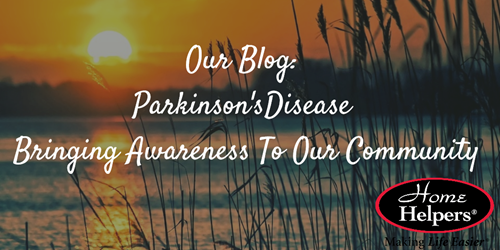Hi, Fellow Community Members!
In early 2015, I attended a Home Helpers Home Care National Conference in which an author of an inspirational book was the keynote speaker. When he first stepped on stage, I could see no signs of Parkinson's Disease. However, as he presented, I (as well as the entire audience) could easily see a gradual increase of tremor (shaking). He continued presenting for quite some time without any mention of tremor. However, after about approximately 40 minutes, he then brought it to our attention that he has Parkinson's and that the effects of the medication he took in the morning to help control it had worn off. Therefore, he called for his wife that was sitting in the audience to bring him his medication so that he could finish his presentation. He finished his presentation and finished strongly.
The keynote speaker could have just given up and walked off stage when the tremor had become overwhelming. Yet he was determined to continue and finish sharing his inspirational words of wisdom. If you take away everything he said that day, just the idea of him never giving up was very inspirational. I took home a book that he authored and finished reading it the next day. I will never forget that day, I will never forget the author T. Scott Gross, and I will never forget his book "Positively Outrageous Service" as they all have inspired me. You can read one of his contributions on forbes.com at the following link:
http://www.forbes.com/sites/prospernow/2013/09/27/can-michael-j-fox-beat-parkinsons/#72bc9f106be6
The purpose of my blog today is to bring more awareness of Parkinson’s disease to the community. With Home Helpers being a provider of elder care services, we have had a number of clients with Parkinson's Disease. I hope you find this blog informative.

Parkinson's Disease: Bringing Awareness To Our Community
Parkinson's is a neurodegenerative brain disorder. In other words, it is related to the breakdown of nerve function. Typically, an individual will live with the disease for years before any sign of symptoms. Over time, an individual's brain produces less and less of a neurotransmitter or brain chemical known as dopamine. As you might have already figured out, less and less dopamine leads to hindered abilities to control the body, movements and emotions.
There is no cure for Parkinson's. However, our goal as caregivers will be to help maintain an individual's quality of life as much as possible. Individuals with Parkinson's that receive in-home care services may have a lower risk of complications, an optimal quality of life and live longer.
I like this article on webmd.com that speaks to the five different stages of Parkinson's Disease. Feel free to read this article as this blog will not go into detail on all of the stages.
http://www.webmd.com/parkinsons-disease/guide/parkinsons-stages
As a non-medical home care agency, our services are commonly requested in stages two or three when mobility and balance issues are becoming more and more apparent. In stage two, you will see that there is difficulty in completing normal tasks. In stage three, there is a slowness in movement. Falls are also increasing becoming more common. The symptoms found in these stages can significantly impair a person's activities of daily living (ADLs) such as bathing, dressing, eating, etc. even though the individual may still be fully independent. In stage four, the symptoms of Parkinson's have become so severe that the individual cannot live on their own. An individual may need to use a walker and most individuals in this stage require assistance with ADLs. In stage five, the symptoms have become so severe that care will be beyond the scope of our services. Our caregiving support will likely supplement the support of nursing care.
Above, we are focusing on the “motor symptoms”. It is also important to be aware of the “non-motor symptoms” or those that do not involve mobility, movement, coordination, etc. These symptoms are more common and may be more disabling than the motor symptoms. Keep a watchful eye out for these symptoms and discuss with a healthcare professional:
- Mood disorders: depression, anxiety, irritability
- Cognitive issues: slowed thinking, memory issues, dementia
- Other issues such as skin issues, weight loss, excess salivation, sleep disorders, constipation, skin issues and loss of energy
Yours truly,
Jonathan Marsh
Thanks for reading our blog. At Home Helpers of Bradenton, we look to not only make life easier but to also make a difference in our clients’ lives. We strive to keep our caregivers with Parkinson’s clients educated on the symptoms of Parkinson’s, as well as safety and environmental concerns. This helps to ensure that we keep our elder care clients, their family, and healthcare professionals informed and to show our value as an integral component in the overall care of the client.
Contact Home Helpers of Bradenton FL for your Parkinson's Disease Home Care Needs
For information about how Home Helpers of Bradenton can serve you and your family, call (941) 499-5946, email JMarsh@HomeHelpersHomeCare.com or visit Parkinson's Disease Home Care Bradenton FL - Home Helpers. Our senior care services including homemaker care, companion care, personal care, Alzheimer's and dementia care, respite care, 24 hour care & live-in care, and monitoring and medical alert services are available in Manatee County and Sarasota County in and around the communities of Anna Maria, Bradenton, Bradenton Beach, Ellenton, Holmes Beach, Lakewood Ranch, Longboat Key, Myakka City, Palmetto, Parrish, and Sarasota. Our main office is located at 4230 59th St W, Ste C, Bradenton, FL 34209.
Save
Save
Save
Save
Save
Save
Save
Save
Save
